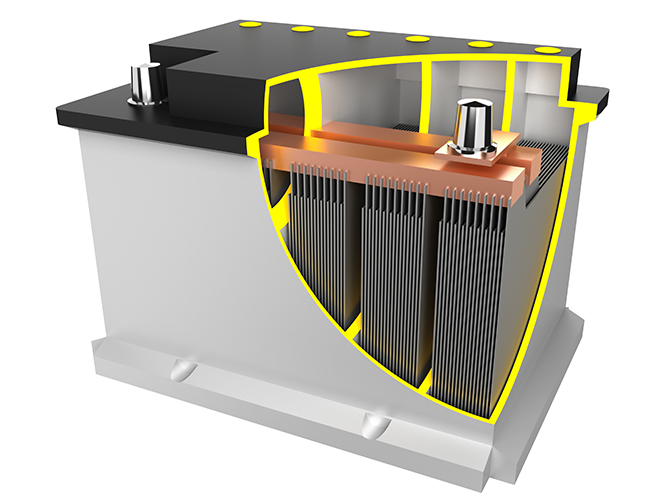Electrolyte specialist Tydrolyte has released an electrolyte intended to replace the sulfuric acid found in lead-acid batteries. It claims that the patent-pending electrolyte is well suited for start-stop batteries, offers lower hold currents and water losses and is less toxic than sulfuric acid.
Start-stop batteries must induce 100 times as many engine ignitions as a conventional battery. They must also be able to handle AC compressor loads and higher charging levels. Tydrolyte’s research has shown that its electrolyte provides 12-19% lower DC charge resistances over the critical partial State of Charge (pSOC) range of 10-20% State of Discharge and 90-80% State of Charge for stop-start and micro-hybrid vehicles. Early testing suggests that the electrolyte may also improve round-trip efficiency as well.
Several companies have subjected the electrolyte to the EN50342-1 test, the standard for automotive accelerated life testing. A battery using the electrolyte was continuously charged at 14.4 V in 60˚ C. It was found that the electrolyte reduced hold current by 24% with the figure improving as the battery aged. The battery also showed smaller water losses and may provide lower positive electrode corrosion. As a cherry on top, the electrolyte is expected to receive non-toxic classification by the US DOT and EPA, which would lower handling costs for manufacturers.
“Many aspects of lead battery chemistry are not fully understood, and this provides a significant opportunity to further enhance the performance of the world’s most popular rechargeable battery technology,” said Advanced Lead-Acid Battery Consortium (ALABC) Manager Dr. Boris Monahov. “We are delighted to welcome Tydrolyte into membership of the ALABC, and strongly support companies such as Tydrolyte in pursuing innovative new solutions to the challenge of improving lead battery performance. There is a bright future for the lead battery, but it is essential that the industry continues to drive innovation to meet future market requirements.”
Source: Tydrolyte via Green Car Congress


















































